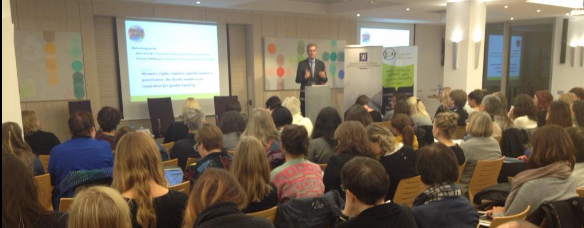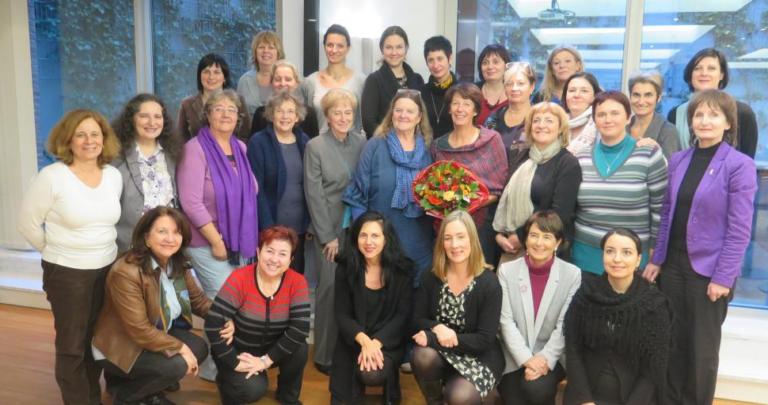[AWID, 21 October 2011] Four years ago, in 2007, a Brazilian judge prosecuted 1,500 women for procuring abortions.[i] That same year, a twenty-year-old woman, Ana María Acevedo, died in Argentina of cancer-related complications because her doctors refused to treat her; she was pregnant and an abortion might have saved her life.[ii]
By Sandra Dughman Manzur with Shareen Gokal
Discriminatory laws and the exercise of control over women’s bodies often justified through arguments based in religion, culture and tradition and public morality oppress, subjugate and violate women’s rights all over the world. Using the law to control women’s sexuality and reproductive decisions and actions is the ultimate assertion of patriarchy by States. These laws are often supported by fundamentalist agendas of power and control, and misguided conceptualizations of women’s role in society that are centered on social and biological reproduction.
A Ground-breaking Report
On October 24th, 2011 Anand Grover, the Special Rapporteur on the right of everyone to the enjoyment of the highest attainable standard of physical and mental health (part of the UN human rights special procedures system) will present, before the UN General Assembly, a ground-breaking report. The report will make one of the clearest statements to date within the international human rights system condemning the negative impacts that criminal laws and other legal restrictions relating to sexual and reproductive health have over women’s freedom, decision-making process, and autonomy.
Moreover, until now, most of the arguments for women’s reproductive and sexual control were formulated, within the UN system, on the basis of risks to the women’s health. With this report there is a historic shift in these arguments away from health-based ones to one that is clearly about respecting women’s agency, bodily autonomy and reproductive and sexual rights.
An Independent Expert on a Mission
Special Rapporteurs are individuals appointed by the Human Rights Council (HRC) to research and oversee specific country situations or themes from a human rights perspective.[iii] Rapporteurs are “experts on mission” who hold all the privileges and immunities granted by the United Nations[iv] and are selected on the basis of expertise, experience, independence, impartiality, integrity and objectivity. They are unpaid, serve in their personal capacities and are not considered UN staff[v].
Special Rapporteurs can – but don’t always – use their special status in effective and innovative ways. As demonstrated by the efforts of Paul Hunt, the former Special Rapporteur on Health, the mandate has the potential to influence issues of concern to women’s rights and human rights within the international system. Paul Hunt focused most of his mandate on emphasizing that maternal mortality is and should be treated as a human rights issue. He presented the argument in his 2006 report to the General Assembly; it was the main topic of his visit to India in 2007; the central theme of his 2007 statement to the HRC; and a side panel to an HRC session in 2008, amongst other interventions. His persistence resulted in a 2009 resolution by the HRC that recognized maternal mortality as a human rights issue.[vi]
This will not be the first time that Anand Grover, a long time HIV and AIDS activist from India, has made waves using his mandate. In 2010, in his last annual report, he was lauded by civil society advocates for taking a clear stance on the decriminalization of drugs. He called for de-penalization and decriminalization of all drug users, the regulation of illicit drugs (similar to what exists for tobacco) and a clear shift in the “war on drugs” policy and other laws with regards to the use and attainment of drugs.
The Urgent Call for States and Non-state Actors to Respect Women’s Decision-making Process within Reproductive Rights
In this report Grover calls on both States and non-state actors to urgently respect women’s decision-making process within the realm of reproductive health and rights. The Rapporteur makes it clear that the use of criminal laws to regulate women’s behaviour during pregnancy is inappropriate, ineffective and disproportionate.[vii] For Grover, the use of force over a woman through the legal system directly affects her human dignity and her ability and freedom to make personal decisions about her sexuality and reproduction.[viii] Criminalization of abortion is the ultimate expression of that interference; it discriminates against, disempowers and stigmatizes women.[ix]
Beyond criminalization of abortion itself, Grover calls into question States that have prosecuted women for their behaviour during pregnancy or held them criminally responsible for the birth of stillborn babies or miscarriages of foetuses. This has included women being charged with child abuse, attempted murder, manslaughter and negligent homicide for the use of illicit drugs and alcohol consumption during pregnancy, failing to follow doctor’s orders, failing to refrain from sexual intercourse or concealing HIV and AIDS status.[x]
Urgent Call to Decriminalize Abortion
The report makes an urgent call to all governments to completely decriminalize abortion. It emphasizes that criminal laws penalizing abortion and imposing a specific conduct on pregnant women “must be immediately reconsidered.”[xi] Notably, the argument is not made solely on the basis of the risk that unsafe abortion may have on women’s health, but on the fact that the use of laws to force pregnancy onto women is an unjustifiable form of coercion.[xii] In Grover’s words:
“Criminal laws penalizing and restricting induced abortion are the paradigmatic examples of impermissible barriers to the realization of women’s right to health and must be eliminated. These laws infringe women’s dignity and autonomy by severely restricting decision-making by women in respect of their sexual and reproductive health.”[xiii] [Emphasis added]
Statement on the Use of “Public Morality” as a Justification to Violate Women’s Rights
The Rapporteur clearly states that notions of “public morality” are used to create and reinforce negative stereotypes of women and violate their rights. He states that public morality cannot serve as justification for laws intended to control women’s bodies and their decision-making process.[xiv] According to the Rapporteur, society, governments and institutions have a clear obligation to protect the right to health from harmful social and traditional practices[xv] and policies based on these practices.[xvi]
States must also protect women and abortion providers from fundamentalists’ actions against them. These actions include: harassment, violence, kidnappings and murder (religiously motivated[xvii] or otherwise);[xviii] pressure to exclude sexual education in school curricula or restrict information and discussion of alternative sexual orientations; promote “abstinence only” education, or reduce sexual education to images and stereotypes of heteronormativity, focusing on procreation.[xix]
He goes further to mention that comprehensive, evidenced-based education and information is a powerful tool for the critical examination of gender inequalities and stereotypes; a way of “eroding deeply entrenched systems of patriarchy” impeding women’s equal participation in society.[xx]
Taking the Report Further
The Rapporteur does not go so far as to unpack “public morality” and demonstrate how political interests and arguments based on culture, religion and tradition are used to limit women’s reproductive health rights and impose narrow notions of morality and rigid sexual norms. Nor does he have the scope within his mandate to mention the specific countries or groups that commit violations against women’s reproductive and sexual rights or specific examples of violations. Therefore, countries which completely ban abortion like Chile, Dominican Republic, El Salvador, Nicaragua, Maldives, Vatican City, and others—whose political or religious elites force their values, principles or religious beliefs upon society to maintain the status quo—cannot be specifically mentioned in the report, although its analysis can and must be applied to hold them accountable for their violations of women’s rights.
A Potential Tool for Change
This report is advancement in and of itself. However, the potential that it has to promote and protect reproductive and sexual health and rights is contingent on how governments, women rights activists and organizations and the international community respond to its findings, conclusions and recommendations. It makes for a strong advocacy tool to hold States to account for their obligations in the realm of reproductive rights and to contribute to the expert analysis and information available in this area.
It would be in the interest of women’s reproductive rights to make the report more accessible, support its findings where appropriate, deepen its analysis further where needed and bring country level violations of the right to health to the Rapporteur’s attention for further action. Advocacy by organizations working on sexual reproductive rights has been strong in the lead up to the presentation of the report and many will be waiting to see the impact that it will have. In the meantime, there are opportunities to support the Rapporteur by writing letters, monitoring the media and responding to any backlash that may arise.
Finally, in their communications (urgent appeals, letters of allegations, public and press statements), country visits and thematic studies, Rapporteurs have the unique ability to cause change –and fast. This report is one example of the ground-breaking, courageous steps Rapporteurs take towards the advancement of women’s rights.
Share your thoughts/ideas with us:
How do you think women’s rights organizations in your country can use the report?
[i] For more information see Carmen Hein de Campos (Themis), Mass Prosecution for Abortion: Violation of the Reproductive Rights of Women in Mato Grosso do sul, Brazil, Case Studies on Resisting and Challenging Fundamentalisms, 2011, AWID, available at http://www.awid.org/Library/Feminists-on-the-Frontline-Case-Studies-of-Resisting-and-Challenging-Fundamentalisms
[ii] For more information see Puyol, Condrac and Manzur, The Death of Ana Maria Acevedo: Rallying Cry for the Women’s Movement, Case Studies on Resisting and Challenging Fundamentalisms, 2011, AWID, available at http://www.awid.org/Library/Feminists-on-the-Frontline-Case-Studies-of-Resisting-and-Challenging-Fundamentalisms
[iii] Human Rights Council, Manual of Operations of the Special Procedures of the Human Rights Council, Geneva, 2008, available at http://www2.ohchr.org/english/bodies/chr/special/docs/Manual_August_FINAL_2008.doc
[iv] Office of the United Nations High Commissioner for Human Rights, Fact Sheet No 27: United Seventeen frequently asked questions about the United Nations special rapporteurs, United Nations, Geneva, available at www.ohchr.org/documents/publications/factsheet27en.pdf, pp. 1 and 15; UN General Assembly, Convention on the Privileges and Immunities of the United Nations, 13 February 1946, available at: http://www.unhcr.org/refworld/docid/3ae6b3902.html article VI, section 22.
[v] See Human Rights Council, Manual of Operations of the Special Procedures of the Human Rights Council, Geneva, 2008, available at: http://www2.ohchr.org/english/bodies/chr/special/docs/Manual_August_FINAL_2008.doc, par. 9 and 10.
[vi] Tedd Piccone, Catalysts for Rights: The Unique Contribution of the U.N.’s Independent Experts on Human Rights, Final Report of the Brooking Research Project on Strengthening U.N. Special Procedures, 2010, p. 63
[vii] UN Human Rights Council, interim report prepared by the Special Rapporteur of the Human Rights Council on the right of everyone to the enjoyment of the highest attainable standard of physical and mental health, Anand Grover, 3 August 2011, A/66/254, available at
http://www.un.org/ga/search/view_doc.asp?symbol=A/66/254, pars. 38-42. [UN Human Rights Council]
[viii]Ibid, par.15.
[ix]Ibid, par. 27
[x]Ibid, pars. 38 and 40
The States may also use civil laws regarding child abuse or neglect for the termination of parental rights and the removal of the child upon birth; Please see UN Human Rights Council supra note 7 at par. 39
[xi]http://www.un.org/ga/search/view_doc.asp?symbol=A/66/254 par. 20; [UN Human Rights Council]; For more information on the Right to Health within the UN system please see: OHCHR and WHO, The Right to Health, Fact Sheet No. 32, Geneva, 2008, available at http://www.ohchr.org/documents/publications/factsheet31.pdf.
[xii] UN Human Rights Council supra note 7, par. 12.
[xiii]Ibid, par. 21.
[xiv]Ibid, par. 18.
[xv] For an account of social and traditional practices that violate women’s reproductive rights please see UN Commission on Human Rights, Report of the Special Rapporteur on violence against women, its causes and consequences, Ms. Radhika Coomaraswamy, 31 January 2002, E/CN.4/2002/83, available at http://daccess-dds-ny.un.org/doc/UNDOC/GEN/G02/104/28/PDF/G0210428.pdf?OpenElement
[xvi] UN Human Rights Council supra note 7, par. 56 and 57
[xvii] For a better understanding of the way fundamentalist projects work to undermine women’s rights please see Cassandra Balchin, Religious Fundamentalisms On The Rise: A Case For Action, Toronto, 2008, AWID, available at http://www.awid.org/Library/Religious-Fundamentalisms-on-the-Rise-A-case-for-action
[xviii] UN Human Rights Council supra note 7, par. 28
[xix]Ibid, pars. 59-63
[xx]Ibid, par. 63.
For a deeper analysis on sexual and reproductive education see UN Human Rights Council, Report of the United Nations Special Rapporteur on the right to education, Vernor Muñoz, 23 July 2010, A/65/162, available at http://www.right-to-education.org/sites/r2e.gn.apc.org/files/SR%20Education%20Report-Human%20Right%20to%20Sexual%20Education.pdf





